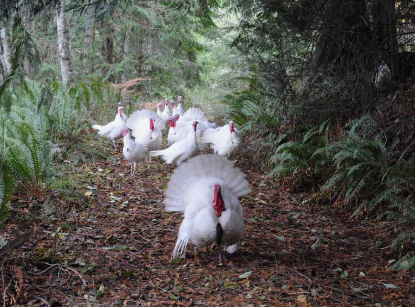
“HEY, I JUST THOUGHT OF A GREAT TITLE FOR A BOOK,” David called from the kitchen yesterday afternoon.
“Oh? And what title is that, my love?” I called back after a moment. I was relaxing by the living room wood stove with a New York Times Sunday crossword puzzle.
“The Mind of a Turkey,” he replied, walking into the living room.
“Well,” I retorted, “That ought to be a pretty short book.”
Okay, so that wasn’t a very charitable remark. We have heard many fairly uncharitable remarks about turkeys, usually from people who have never actually raised them. Several years ago, when we were first contemplating the addition of turkeys to the farm, we heard this one frequently: “Why would you want to raise turkeys? They’re so stupid!” This was often followed by the recital of one or more supposedly funny myths about turkeys. Yawn.
Since you’ve apparently read this far, you know we love our turkeys. You also know that, after raising both Midget White and Narragansett turkeys the first year, we settled on the Midget White as the right breed for us. As I write this, it’s November, and Thanksgiving is just a few weeks away. So, being in the sentimental mood that the approaching holiday season sometimes brings out in me, I thought I’d share some of our observations about, well, the mind of a turkey.
First, we don’t consider turkeys to be any less intelligent than chickens. Stop snickering! Turkeys are people too, and they have feelings. Seriously, we do think turkeys have more personality than chickens, and their mannerisms are fairly adorable, at least sometimes. We especially love their habit of following us around; they seem to just be insatiably curious about what we’re up to. Anyone who’s visited the farm knows that the turkeys appear en masse to greet newcomers. (We had a funny incident last year with a substitute UPS driver, who positively leaped back into his truck when the turkeys approached; the poor guy thought he was being attacked.)
At this time of year, the turkeys that were hatched in the spring are mostly between six and seven months old. The young males of this age tend to fight quite a bit, although among the Midget Whites, we haven’t seen things escalate to the point of drawing blood very often. They are also vying for the attention of the females (there are naturally more hens than toms in the flock), and doing their best to emulate their dad by fanning out their tails and puffing out their feathery white chests. Their attempts at mating lack a certain finesse at this stage. I suspect that the boys are also trying to impress us, knowing that we will be keeping only a few of them for breeding next spring. Okay, maybe I’m giving them too much credit there.

Turkeys following us through the woods.
Since a rash of bobcat attacks a couple of years ago, we have been reminded of how much we appreciate the relative lack of trouble the turkeys have had with predation. I was nervous the first year we raised Midget Whites, especially when they were small; I worried that when they began to free-range, their bright white color would make it too easy for predators (particularly hawks and eagles) to spot them. We think that part of their survival is due to their tendency to hang out as a group most of the time. They also don’t usually wander as close to the edge of the woods as the chickens do. Say what you like about their brains, we love their instinct for survival!
Then there’s the wonderful dance the toms do when trying to impress the hens, and the curious deep rumbling sound — like the sound of a Harley-Davidson starting up in the distance — you can hear it if you’re close enough to a tom when he’s expanding his chest. We’re fascinated by the way a tom’s face and wattles change color rapidly, from deep solid red to a pale pink to bluish-white. What’s this all about? We laugh about it being like some kind of built-in mood ring, or maybe it’s a hormone thing. And of course, the way they walk around the house, looking in all the windows trying to see where we are; they’re such adorable little Peeping Toms.
As we gear up for the two days of slaughtering right before Thanksgiving, we’re thinking over all we’ve learned and experienced over the past several years of raising turkeys. They are sweet, often funny and entertaining creatures. While they may not be the most intelligent animals around, they have definitely been an asset to our farm, and it’s hard to picture life here without them.